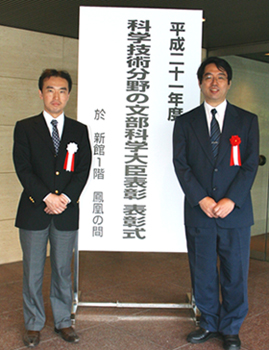| RIKEN Center for Developmental Biology (CDB) 2-2-3 Minatojima minamimachi, Chuo-ku, Kobe 650-0047, Japan |
June 5, 2009 – At a ceremony this spring, CDB Group Director Yoshiki Sasai (Laboratory for Organogenesis and Neurogenesis) and Mitinori Saitou (Laboratory for Mammalian Germ Cell Biology) were both honored with awards for their scientific achievements by the Ministry of Education, Culture, Sports, Science and Technology (MEXT).
Sasai’s award was in recognition of his research into the induction of differentiation of pluripotent stem cells into various neuronal lineages, including dopaminergic, motor, sensory, hippocampal and cortical. Dopaminergic neurons differentiated using the group’s methods have been shown to be effective in the treatment of a primate model of Parkinson’s disease, and a recent publication by the lab revealed a 3-D in vitro model of corticogenesis. The Sasai lab also devised a method for improving the efficiency of human pluripotent stem cell culture, which is now commonly used in labs and cell banks around the world. Sasai also heads the CDB Human Stem cell Technology Division, which conducts a lecture and training series to promote pluripotent stem cell research in Japan as part of a MEXT project to realize the promise of regenerative medicine. “The work that led to this award was made possible by the creative insights and keen observations and analyses of a number of students and young scientists in the lab, so I feel only that I accepted it on their behalf,” says Sasai. “I look forward to continuing to take advantage of the tremendous opportunities for scientific exchange that the CDB affords, and to exploring and discussing new ideas and results in our lab in the future.” Saitou was recognized for his work on the emergence of the germline in early embryonic development in mammals. Using genome-wide analyses and single-cell gene expression studies, his team has identified numerous germline-specific determinants. A single-cell microarray technique developed by the lab enabled the discovery of the highly coordinated network of genetic activity that steers a small cohort of cells in the early embryo to adopt a primordial germ cell fate. “I think this is the culmination of a series of small steps forward we made at the CDb, thanks to the wonderful research and intellectual environment here,” says Saitou. “I am very happy that our lab’s efforts have been recognized with this award, and hope to continue in our research in the future as well.” |
|||||
 |
| Copyright (C) CENTER FOR DEVELOPMENTAL BIOLOGY All rights reserved. |
